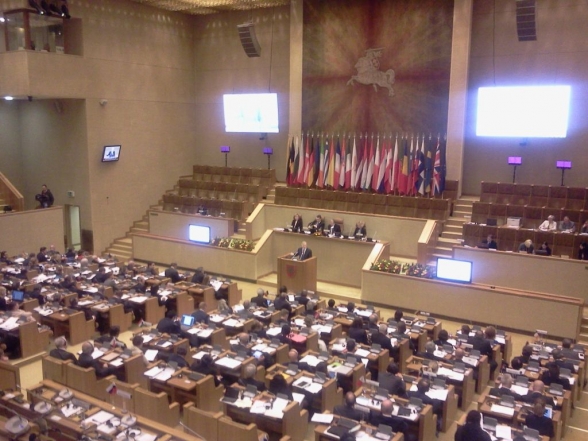The 50th jubilee meeting of the Conference of Community and European Affairs Committees of Parliaments of the European Union (COSAC), which was being held in Vilnius within the parliamentary part of the presiding over the European Union, ended today.
The second working day started with holding of the first meeting of the COSAC Women’s Forum, where a declaration was adopted, pointing out the need to have the European parties pay more attention to gender equality, equal opportunity policy, gender balance in the society, and a more active participation of women in politics. The declaration encouraged women to be more ambitious and to actively participate in politics and decision-making in the European Union, and that the parliaments should continue to develop the initiative of promotion of participation of women parliamentarians in the COSAC work.
The meeting continued with a discussion on democratic legitimacy within the EU, on the role of national parliaments of the Union member states, as well as on the challenges and perspectives of the Digital Agenda, focused on cyber safety and advantages of business operations. It was pointed out that the institutional architecture of the EU was based on two types of legitimacy, which was recognised at the national and European level, and that in accordance with that it was necessary to find a true balance between the parliamentary control which was achieved at the national level by the national parliaments and at the European level by the European parliaments. Additionally, a concern was expressed with regard to the negative long-term social consequences, caused by the economic and financial crisis, especially in conditions of growing unemployment and social exclusion in Europe.
A member of the Committee on European Integration Mr Genci Nimanbegu said that he was expecting the Digital Agenda to help with moving the EU economy and increasing the opportunities of the European citizens and enterprises to achieve maximum out of new digital technologies. Additionally, by combining the Digital Agenda with the principle of data and privacy protection, the trust of citizens in the European model of regulating this issue would be strengthened. The MP Nimanbegu pointed out that the digital ecosystem was growing faster than any other area of society and that a more effective usage of digital technology was a challenge that we must face, for the purpose of better life quality. He informed the gathering on the fact that Montenegro had adopted the Strategy for Development of Information Society for the period 2012-2016, based on the goals defined in the Digital Agenda for Europe, but Montenegro, as well as other countries in the region, was facing numerous challenges in fulfilling goals. Montenegro still had not harmonised its goals relating to the broadband internet, and penetration of the broadband technology was significantly under the EU level.
The end of the meeting was marked by adoption of conclusions, which stated that it was necessary to ensure active engagement of citizens in the discussion regarding the EU future and participation in the European elections the following year. COSAC invited the national parliaments to establish new parliamentary groups aimed at examining specific issues on policy creation. COSAC also pointed out the importance of implementation of the “fundamentals first principle” promoted in the latest European Commission’s Progress Report and confirmed the view that the enlargement process was a policy enabling the uniting of Europe together with the countries of the Western Balkans.
The two-day meeting was attended by the representatives of the Parliament of Montenegro, the Chairperson of the Committee on European Integration Mr Slaven Radunović, as well as members Ms Nada Drobnjak and Mr Genci Nimanbegu.








